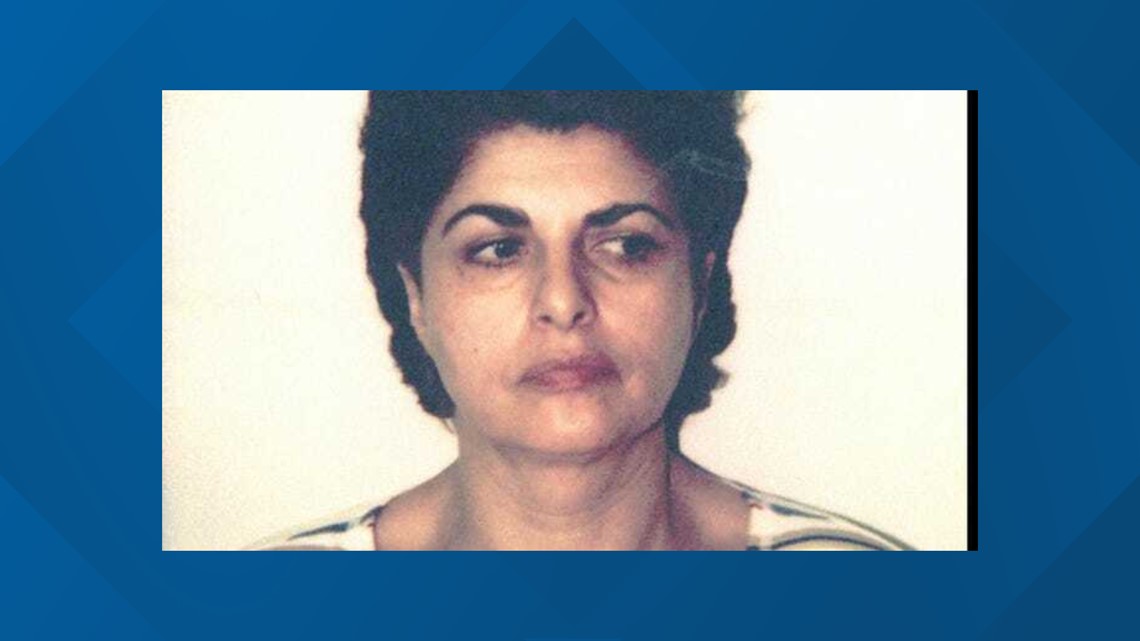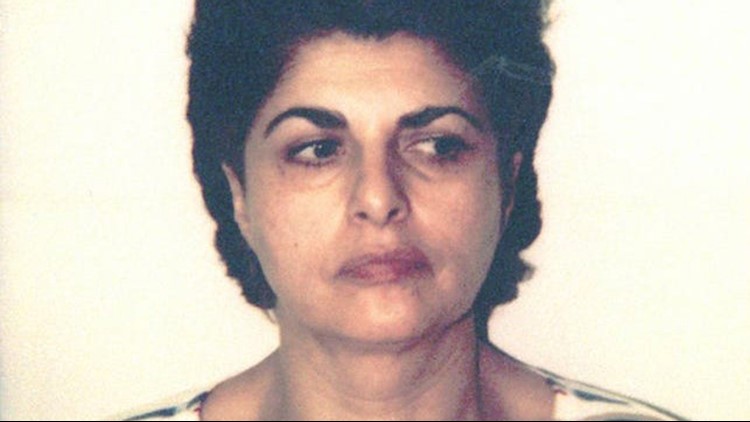FORT WORTH, Texas — Rita Gluzman, who was convicted of killing her husband with an ax and hammer in 1996, was released from a federal prison in Fort Worth on Tuesday.
According to court records, Gluzman was granted a compassionate release from FMC Carswell after experiencing several medical issues including multiple strokes and a diagnosis of early Parkinson’s disease.
Court documents show Gluzman has trouble standing up and walking, and she relies on a walker or wheelchair to move around.
After her release, Gluzman flew from DFW International Airport to New Jersey to begin five years of court-ordered supervised release. Gluzman is staying at a Sheraton hotel in New Jersey before moving to a home in Hackensack, about 20 miles outside of New York City.
According to the conditions for her supervised release, Gluzman will be confined to her home with few exceptions, including doctor appointments, court appearances, religious services, employment, education, or other court-approved activities.
Gluzman also will have to wear a GPS monitoring device. While out on probation, Gluzman will be cared for by her sister.
Gluzman served nearly 19 years of her life sentence at FMC Carswell.
The murder of Yakov Gluzman
Shortly before fleeing the Soviet Union for Israel early in the 1970s, Rita Gluzman married Yakov Gluzman. Yakov wasn’t allowed to leave the Soviet Union, but later on, he was allowed to join Rita in Israel after she held an 18-day hunger strike at the United Nations.


The couple moved to the United States in 1977. According to court documents, Rita was an electrochemist and Yakov later worked as a molecular biologist. They founded an electronics company together.
But, as the years went by, the marriage began to deteriorate.
Court documents show Rita Gluzman suffered physical abuse by her husband. Yakov moved out of the home in 1995. Rita rejected Yakov’s push for an out-of-court divorce settlement.
Rita Gluzman’s mental health began to slide when she found out Yakov started a relationship with a woman in Israel, her attorneys argued. Court documents show Rita hired a private investigator to track her husband and his new girlfriend and even installed audio recorders in Yakov’s apartment.
According to court documents, Rita Gluzman asked her cousin, Vladimir Zelenin, for help to kill her husband. Zelenin agreed.
Gluzman and Zelenin first tried to kill Yakov Gluzman on April 5, 1996, but he never showed up at his home in New York City.
The next day, Gluzman and Zelenin waited back at Yakov’s apartment. Rita Gluzman was armed with an ax and a hammer. Zelenin had an ax and a knife. One of the axes, according to records, was from Yakov’s residence. Rita and Zelenin bought the second ax from a store.
When Yakov Gluzman got home, his wife and her cousin attacked him with the axes, knife, and hammer. During the attack, Rita accidentally hit Zelenin in the hand, causing him to bleed.
After Yakov Gluzman was dead, Rita Gluzman cleaned the apartment while Zelenin cut Yakov’s body into pieces and put them into bags, records show.
The next morning, on April 7, 1996, Rita Gluzman told Zelenin to dump the bags into the river near the offices of the electronics company the Gluzmans founded. But, while doing so, a police officer saw Zelenin dumping the bags, noticed the blood on his hand, and arrested him.
Zelenin confessed. But, Gluzman tried to flee.
Eleven days later, on April 18, 1996, investigators took Rita Gluzman into custody for the murder of Yakov Gluzman.


‘I did not do it and I still say that in front of the world’
The federal trial against Rita Gluzman began on January 6, 1997.
On April 30, 1997, a judge sentenced Gluzman to life in prison under mandatory sentencing guidelines at that time.
Gluzman was the first woman to be convicted under the Violence Against Women Act, which was signed into law by President Bill Clinton in 1994.
After sentencing, Gluzman said “Your Honor, I did not do it and I still say that in front of the world.”
When Gluzman was 48, she went into confinement at a low-security correctional facility in Danbury, Connecticut. In September 2001, Guzman suffered a stroke while in the facility caused by a blood clot that formed after she began to take medicine to treat symptoms of menopause, according to court documents.


The next month, in October 2001, Gluzman was transferred to Fort Worth’s Federal Medical Center Carswell, where she has been held ever since.
Seeking compassionate release
Gluzman, herself, was among 20 people who wrote the court supporting her release: “I am a 71-year-old disabled, G-D fearing woman who spent 24 years filled with pain and tears in prison. I am writing to ask you to give me a second chance, so that I do not have to die in prison. My involvement in the criminal acts outlined in my case do not reflect the woman facing you now. I have gone from a healthy, active, productive woman in her 40’s to a sick, elderly person who requires a wheelchair to get around. I am afflicted by numerous ailments and in constant debilitating pain. I am currently over 1,500 miles away from my family, ex coworkers and friends.”
Yakov Gluzman’s brother was among those who wrote the court opposing her release saying it “horrified” his whole family.
“I am convinced that if she is released, I would live out my life in fear for myself and my children. I am now in the process of going through cancer treatment and the news about her possible release from prison severely affected my emotional well-being,” Michael Gluzman said. “All these years I believed in the American Justice System and in the fairness of this system. Therefore, I ask not to bring up the issue of releasing this person from custody ever again and to extend her time in prison.”
Gluzman previously sought compassionate release in 2019 for having “a debilitated medical condition,” but the warden at FMC Carswell denied that request. Gluzman appealed, but that, too, was denied stating, “a review of your condition does not necessitate an end-of-life trajectory.” A second appeal also was denied.
On June 2, 2020, Gluzman filed a motion in federal court for compassionate release stating her claim met a statutory “extraordinary and compelling’ test, “even without considering the COVID-19 pandemic.” Cases of COVID-19 at FMC Carswell have been spiking. As of July 13, 2020, 127 inmates tested positive for COVID-19. As of July 25, 2020, the total was up to 517 inmates who tested positive.
On July 23, 2020, United States District Judge Lewis J. Liman granted Gluzman’s motion for compassionate release.
As part of her release, Gluzman must buy an iPhone with FaceTime to allow for virtual check-ins with her probation officer.
She also cannot have “unsolicited contact” with certain relatives, including her son, grandchildren, and other extended family members specified by the court.



